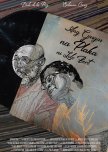Esta resenha pode conter spoilers
Filmmakers did not waste any second. Every scene was flawless.
The first few minutes are all about lolo Bert (Dido Dela Paz). He lives alone in an old brown house. He doesn’t like company so he pretty much ignores people who knock on his door. If you don’t read the synopsis as I do, you will start to think that lolo Bert is an introvert. He cherishes serenity and enjoys a hot cup of coffee on a rainy day. But soon you find out that he is suffering.
Ang Gasgas na Plaka ni Lolo Bert Poster*Side note: As lolo Bert cleans the old piano, we see two books – A Credible Threat by Janet Dawson and Trip to Quiapo: Scriptwriting Manual by Ricky Lee. Because you don’t just put sir Ricky Lee’s book for no reason, I searched for the first book.
The first phrase from the summary caught my eye. It says, “The pleasant old brown shingle house…” Lolo Bert lives in a sombre old brown house. Moreover, one of the filmmakers, Janina Gacosta joined the Ricky Lee Scriptwriting Workshop.
As per the opening, we see a short report from the UNAIDS about the estimated number of people with HIV (PLHIV) in the country. In the end, we see an all too familiar line that says a lot about our society.
"HIV doesn’t kill – stigma does"
No wonder lolo Bert has shunned himself from the outside world and has somehow given up. But that changed when another unexpected knock comes at his door. It’s a box of memories where he finds an old vinyl record which we know by the title is broken.
When it did not properly play, he set out to have it fixed. Miyo (Soliman Cruz), the owner of the shop is a pleasant and friendly character. He is quite an open character and reveals too much about himself throughout lolo Bert’s trip to his shop. As expected, our main lead could not be bothered. But after a while, he succumbs to his desire.
The way this happened is very beautiful. From a sombre, old brown house to a bright, music-filled brown house, we see him dance with his ex-lover. When he wakes up, he did what he had to do – open up and be happy.
This short film has a running time of 19:07 minutes and the filmmakers did not waste any second. Every scene was flawless especially the set design, lighting and music. I felt sad for our main and even cried during the dance scene but eventually felt happy as he accepted the fact that he found and deserves happiness, too.
Ang Gasgas na Plaka ni Lolo Bert Poster*Side note: As lolo Bert cleans the old piano, we see two books – A Credible Threat by Janet Dawson and Trip to Quiapo: Scriptwriting Manual by Ricky Lee. Because you don’t just put sir Ricky Lee’s book for no reason, I searched for the first book.
The first phrase from the summary caught my eye. It says, “The pleasant old brown shingle house…” Lolo Bert lives in a sombre old brown house. Moreover, one of the filmmakers, Janina Gacosta joined the Ricky Lee Scriptwriting Workshop.
As per the opening, we see a short report from the UNAIDS about the estimated number of people with HIV (PLHIV) in the country. In the end, we see an all too familiar line that says a lot about our society.
"HIV doesn’t kill – stigma does"
No wonder lolo Bert has shunned himself from the outside world and has somehow given up. But that changed when another unexpected knock comes at his door. It’s a box of memories where he finds an old vinyl record which we know by the title is broken.
When it did not properly play, he set out to have it fixed. Miyo (Soliman Cruz), the owner of the shop is a pleasant and friendly character. He is quite an open character and reveals too much about himself throughout lolo Bert’s trip to his shop. As expected, our main lead could not be bothered. But after a while, he succumbs to his desire.
The way this happened is very beautiful. From a sombre, old brown house to a bright, music-filled brown house, we see him dance with his ex-lover. When he wakes up, he did what he had to do – open up and be happy.
This short film has a running time of 19:07 minutes and the filmmakers did not waste any second. Every scene was flawless especially the set design, lighting and music. I felt sad for our main and even cried during the dance scene but eventually felt happy as he accepted the fact that he found and deserves happiness, too.
Esta resenha foi útil para você?















